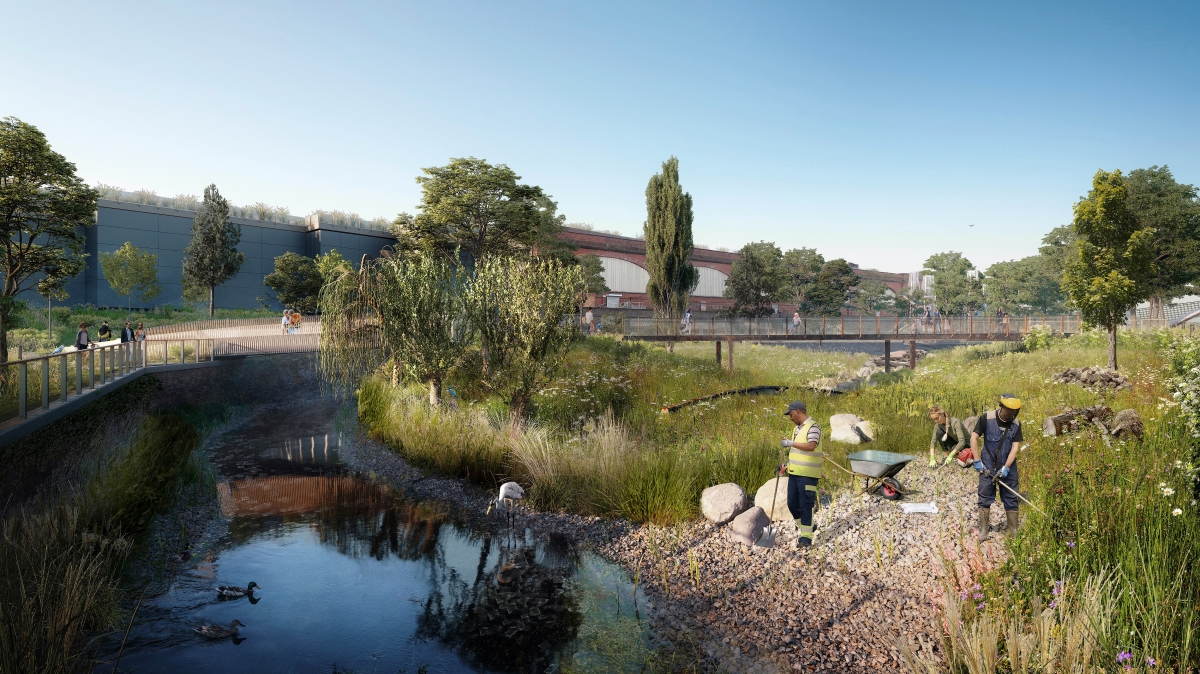Irrigation scheme will support delivery of 24-acre ‘shovel ready site’ identified by GM LEP and GMCA for funding from Government’s Getting Building Fund, supporting Economic Vision’s ambitions for green growth
The developers behind Manchester’s first new public park in 100 years will use water from recently rediscovered Victorian wells as a sustainable source of irrigation.
The construction team delivering Mayfield Park located 12 wells across the 24-acre site.
While many were backfilled or damaged, and have been permanently capped, three wells – the largest of which was used to supply the former Britannia Brewery which was based on the east of the site in the late 19th and early 20th Century – will be reused.
Mayfield Park was one of seven projects in Greater Manchester to receive a share of £54.2m from the UK Government’s Getting Building Fund.
Projects were chosen that would support the Greater Manchester Local Industrial Strategy agreed with Government by the Greater Manchester Combined Authority and GM LEP in 2019.
The Government pledged £23m of investment from its Getting Building Fund – one of the largest investments in any single project – to Mayfield Park.
This investment, delivered through the GMCA, is part of the Government’s strategy to support ‘shovel ready’ schemes that will help to drive economic recovery following the COVID-19 crisis.
The long-term proposals at Mayfield will seek to enhance many of the site’s historic features. The vast depot building beneath the station building has already been transformed into a new cultural venue, Depot Mayfield, which contributed to bringing 330,000 visitors to Mayfield in 2019, after more than 30 years of decline.
Overall, the Mayfield regeneration scheme – one of the largest in the UK – is set to transform a previously derelict part of Manchester’s industrial heritage to deliver 1,500 homes, 1.6m sq ft of market-leading commercial space, 300,000 sq ft of retail and leisure facilities and 14 acres of the new public realm.
The well water has been subject to stringent tests and declared safe for irrigation use.
This means that 20 cubic metres of water per day can be pumped from the wells to keep the park’s hundreds of trees and plants lush and thriving, reducing the burden on the mains supply and providing significant sustainability benefits.
Established in the 1830s, the Britannia Brewery was described in 1888 by the Manchester Courier and Lancashire General Advertiser as “one of the most important in Lancashire” and was able to produce more than 300 barrels of beer a week.
The plan to reuse the wells is the latest step taken by the Mayfield Partnership – the public-private venture led by U+I – to incorporate Mayfield’s rich history into its new lease of life.
The wells were discovered while archaeologists were on-site cataloguing the historic features of the Mayfield site, which sits adjacent to Piccadilly Station.
They are among several important discoveries made at Mayfield as work on the transformational £1.4bn regeneration scheme gains momentum.
Arlene Van Bosch, development director at U&I said:
“In forming our plans for Mayfield we’ve taken inspiration from the ingenuity that made the area a hive of activity during the industrial revolution. So, it’s entirely fitting that we’re now able to find new uses for some of the historical assets we’ve discovered as we create a stunning new public amenity at Mayfield Park.
“Although Manchester of course does not have any shortage of water, it makes both economic and environmental sense for us to use this amazing natural resource beneath our feet, which clearly further connects us to Mayfield’s industrial past.”
Achieving green economic growth is a key focus for the Greater Manchester Economic Vision.

New Mayfield Park (Image Credit: Mayfield Partnership)
